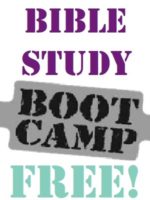
Introduction
When Apollo 11 neared the moon in July 1969, the editors of The New York Times felt their coverage of the first step on lunar soil should go beyond headlines and photos to embrace an achievement shared by all humanity. So they asked Pulitzer Prize-winner Archibald MacLeish to write a poem. The day after Neil Armstrong and Edwin Aldrin Jr. walked on the moon, the front page contained these words: You were a wonder to us, Unattainable, A longing past the reach of longing, A light beyond our light, our lives, Perhaps a meaning to us, Our hands have touched you in your depth of night. That day, through the hands of others, we "touched the moon.” by David C. McCasland A more significant historical event occurred that the apostle John describes in 1 John 1:14. And though we cannot physically see or touch Jesus, through John’s testimony, we too can have access to the “unattainable wonder” of Jesus, who eternally existed with the Father, through John’s words. Augustine once said, “God gave Himself for a time to be handled by the hands of men.” Let’s consider the words of John who actually walked, talked and ate with Jesus, and how profound these first four verses in 1 John 1:1–4 are.
Observation
Prayer
Begin each study with prayer. Ask the author, God, to expand your view of who He is through His Word and through this study.
Read Focus Verse
Take a moment and read 1 John 1:1–4. Most scholars agree John the Apostle wrote this epistle, though he is never named. Soak in each word as if John himself wrote the letter specifically for you and has important information to share.
A Wonderful Letter
John the apostle makes some assertions about Jesus in the very first verse of his epistle (letter). See if you can identify these five facts.
Read in Context
Now that you’ve read the main verse of our study today, expand your reading context to get a bigger picture of what’s being discussed. Take a moment and read the entire first chapter of 1 John. If while reading you gain a sense of what this entire chapter is about, please enter it as a chapter theme. Don’t worry, if the chapter theme isn’t clear to you at this point you can add it later.
Keyword - "Life"
Use the marking for “Life” (to the right) to give a visual queue of what the text is describing. Sometimes you will see similar words such as “alive” or “live.” Mark those in the same way.

Life
Who?
Read John 1:1–4 again, but this time mark any word or phrase that points to who this “life” is.
Interpretation
The Word Existed
I’m sure you have noticed that this “eternal life” existed from the beginning, and yet John says he saw, heard and touched this life. What is this telling you about the very one who exists from eternity past?
Beginnings 1
There are three great “beginnings” mentioned in the Bible. One is in our Scripture for the lesson, 1 John 1:1–4. Another is John 1:1. Look up this verse and note the similarities and differences between the opening verses of John's gospel and his first epistle, 1 John.
The Word
Both 1 John 1:1–4 and John 1:1 reference the “Word”. Look this word up in a concordance, and note anything you learn.
Strong's G3056
Greek,logos [log'-os]
--Noun Masculine
Origin: from (3004)
Definition:
- of speech
- a word, uttered by a living voice, embodies a conception or idea
- what someone has said
- a word
- the sayings of God
- decree, mandate or order
- of the moral precepts given by God
- Old Testament prophecy given by the prophets
- what is declared, a thought, declaration, aphorism, a weighty saying, a dictum, a maxim
- discourse
- the act of speaking, speech
- the faculty of speech, skill and practice in speaking
- a kind or style of speaking
- a continuous speaking discourse - instruction
- doctrine, teaching
- anything reported in speech; a narration, narrative
- matter under discussion, thing spoken of, affair, a matter in dispute, case, suit at law
- the thing spoken of or talked about; event, deed
- its use as respect to the MIND alone
- reason, the mental faculty of thinking, meditating, reasoning, calculating
- account, i.e. regard, consideration
- account, i.e. reckoning, score
- account, i.e. answer or explanation in reference to judgment
- relation, i.e. with whom as judge we stand in relation
- reason would
- reason, cause, ground
- In John, denotes the essential Word of God, Jesus Christ, the personal wisdom and power in union with God, his minister in creation and government of the universe, the cause of all the world's life both physical and ethical, which for the procurement of man's salvation put on human nature in the person of Jesus the Messiah, the second person in the Godhead, and shone forth conspicuously from His words and deeds.
Beginnings 2
Another “beginning” is Genesis 1:1. Look up this verse and note the similarities and differences between the opening verses of John's gospel (John 1:1) and the first words of 1 John 1:1¬4.
Life Manifested
In 1 John 1:2, John says this eternal life “appeared” or “was manifested.” Look up this word in a concordance, and note anything you learn.
Strong's G5319
Greek,phaneroo [fan-er-o'-o]
--Verb
Origin: from (5318)
Definition:
- to make manifest or visible or known what has been hidden or unknown, to manifest, whether by words, or deeds, or in any other way
- make actual and visible, realised
- to make known by teaching
- to become manifest, be made known
- of a person
- expose to view, make manifest, to show one's self, appear
- to become known, to be plainly recognised, thoroughly understood
- who and what one is
Witness / Testify
In biblical times, like today, more than one witness was required in criminal cases (Deut. 17:6; 19:15). They were the first to execute the sentence on the condemned (Deut. 13:9; 17:7; 1 Kings 21:13; Matt. 27:1; Acts 7:57, 58). False witnesses were liable to punishment (Deut. 19:16-21). It was also an offence to refuse to bear witness (Lev. 5:1). Consider if this sheds any light on what John is revealing in these first four verses.
Click To Visit WebsiteWhat Jesus Said About Life
Now, watch this short video, to see what Jesus said about true life.
Fellowship
John writes that he is proclaiming this message “so that you may have fellowship with us.” Look up the word “fellowship” in a concordance, and write down anything you learn.
Strong's G2842
Greek,koinonia [koy-nohn-ee'-ah]
--Noun Feminine
Origin: from (2844)
Definition:
- fellowship, association, community, communion, joint participation, intercourse
- the share which one has in anything, participation
- intercourse, fellowship, intimacy
- the right hand as a sign and pledge of fellowship (in fulfilling the apostolic office)
- a gift jointly contributed, a collection, a contribution, as exhibiting an embodiment and proof of fellowship
Fully God, Fully Man
John and the disciples "beheld" and "handled" (or touched) Jesus. In Jesus’ day, Greek and Roman mythology was filled with legends of ancient gods who descended from heaven and took human form, but no one ever heard or saw them, and no one ever touched them. Journal your thoughts on what God is revealing about Jesus.
Seen and Heard
J. Kistemaker feels that by repetition of the verbs seen and heard, John wants his readers to know the core of the apostolic message: “Jesus Christ, the Son of God, has appeared in human flesh.” As an eyewitness and ear-witness, John is able to testify to the veracity of this message and proclaim what he has seen and heard (J. Kistemaker: New Testament Commentary).
Complete (full) Joy
In 1 John 1:1-4, John writes that he desires for his readers/hearers to be “full” or “complete.” Look this word up in a concordance, and note anything you learn.
Strong's G4137
Greek,pleroo [play-ro'-o]
--Verb
Origin: from (4134)
Definition:
- to make full, to fill up, i.e. to fill to the full
- to cause to abound, to furnish or supply liberally
- I abound, I am liberally supplied
- to cause to abound, to furnish or supply liberally
- to render full, i.e. to complete
- to fill to the top: so that nothing shall be wanting to full measure, fill to the brim
- to consummate: a number
- to make complete in every particular, to render perfect
- to carry through to the end, to accomplish, carry out, (some undertaking)
- to carry into effect, bring to realisation, realise
- of matters of duty: to perform, execute
- of sayings, promises, prophecies, to bring to pass, ratify, accomplish
- to fulfil, i.e. to cause God's will (as made known in the law) to be obeyed as it should be, and God's promises (given through the prophets) to receive fulfilment
Application
God Speaks
Ask God what He’s saying to you personally through these verses. Write it down.
Thank you, John!
John and the disciples were able to see, hear and touch Jesus, the “Word of Life,” and were eyewitnesses to his life, death and resurrection. You and I aren’t able to, but we can trust the disciples’ witness. Journal your thoughts after studying these four verses, and what understanding this truth means for you.
Wrapup
Closing
We hope that you enjoyed this study and that it has given you a fresh view of just how awesome God is!
Feedback
Please take a brief moment to provide us some feedback on this lesson. We're always striving to improve, and with your help, we will.
Click To Visit WebsiteSupport our Ministry
Please join us in our quest to help the world discover the beauty of the Bible. Consider making a generous donation today.
Click To Visit Website









Comments are closed, but trackbacks and pingbacks are open.